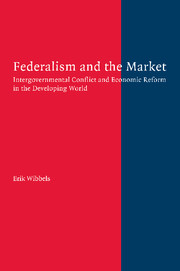Book contents
- Frontmatter
- Contents
- Acknowledgments
- 1 Intergovernmental Bargaining and Economic Policy in Federations
- 2 From Market-Preserving to Market-Distorting Federalism: Divergent Incentives and Economic Reform in Developing Nations
- 3 Federalism and the Decentralized Politics of Macroeconomic Policy and Performance
- 4 Testing the Model: Macroeconomic Reform Beyond the Federal-Unitary Distinction
- 5 Partisan Harmony, Intergovernmental Coordination, and Market Transitions: The Case of Argentina
- 6 Regional Competition, Fiscal Dependence, and Incentives in the Argentine Provinces
- 7 The View from Below: The Politics of Public Sector Reform in Three Argentine Provinces
- 8 Conclusion: Federalism, Reform, and Enduring Puzzles
- References
- Index
7 - The View from Below: The Politics of Public Sector Reform in Three Argentine Provinces
Published online by Cambridge University Press: 20 July 2009
- Frontmatter
- Contents
- Acknowledgments
- 1 Intergovernmental Bargaining and Economic Policy in Federations
- 2 From Market-Preserving to Market-Distorting Federalism: Divergent Incentives and Economic Reform in Developing Nations
- 3 Federalism and the Decentralized Politics of Macroeconomic Policy and Performance
- 4 Testing the Model: Macroeconomic Reform Beyond the Federal-Unitary Distinction
- 5 Partisan Harmony, Intergovernmental Coordination, and Market Transitions: The Case of Argentina
- 6 Regional Competition, Fiscal Dependence, and Incentives in the Argentine Provinces
- 7 The View from Below: The Politics of Public Sector Reform in Three Argentine Provinces
- 8 Conclusion: Federalism, Reform, and Enduring Puzzles
- References
- Index
Summary
With the previous chapter, I tested the last remaining aspect of this book's model of intergovernmental bargaining. In finding support for the notion that provincial politicians respond to the competitiveness of their subnational electoral environments in designing fiscal institutions and conducting fiscal policy, the chapter provides the last link in the complex intergovernmental negotiations that shape the federal politics of market reforms. Placed in the broader federal game, subnational officials take their electoral motivations and the intergovernmental fiscal incentives to the bargaining table with national officials. The national representation of pro- and antimarket reform regional allies gives regional leaders influence over national policy makers, whereas national leaders can rely on their partisan powers to influence regional politicians. Taken together, these factors can produce a profoundly dysfunctional intergovernmental bargaining environment, or, alternatively, one that lends itself to smooth, coherent economic policy.
The empirical approach in previous chapters has taken one of two forms: either the testing of very parsimonious models of macroeconomic or provincial fiscal policy (Chapters 3, 4, and 6) or a case study approach that aggregates the interests of regional politicians to explore the general characteristics of national-regional interactions (Chapter 5). Both approaches are tremendously valuable. They are limited, however, in the degree to which they can add to the bare bones of the bargaining model. They tell us little, for instance, about the social foundations for competitive politics at the regional level, how exactly intergovernmental partisan relations work in different regional contexts, or how those relations shape the fiscal game between leaders at different levels of government.
- Type
- Chapter
- Information
- Federalism and the MarketIntergovernmental Conflict and Economic Reform in the Developing World, pp. 197 - 222Publisher: Cambridge University PressPrint publication year: 2005

